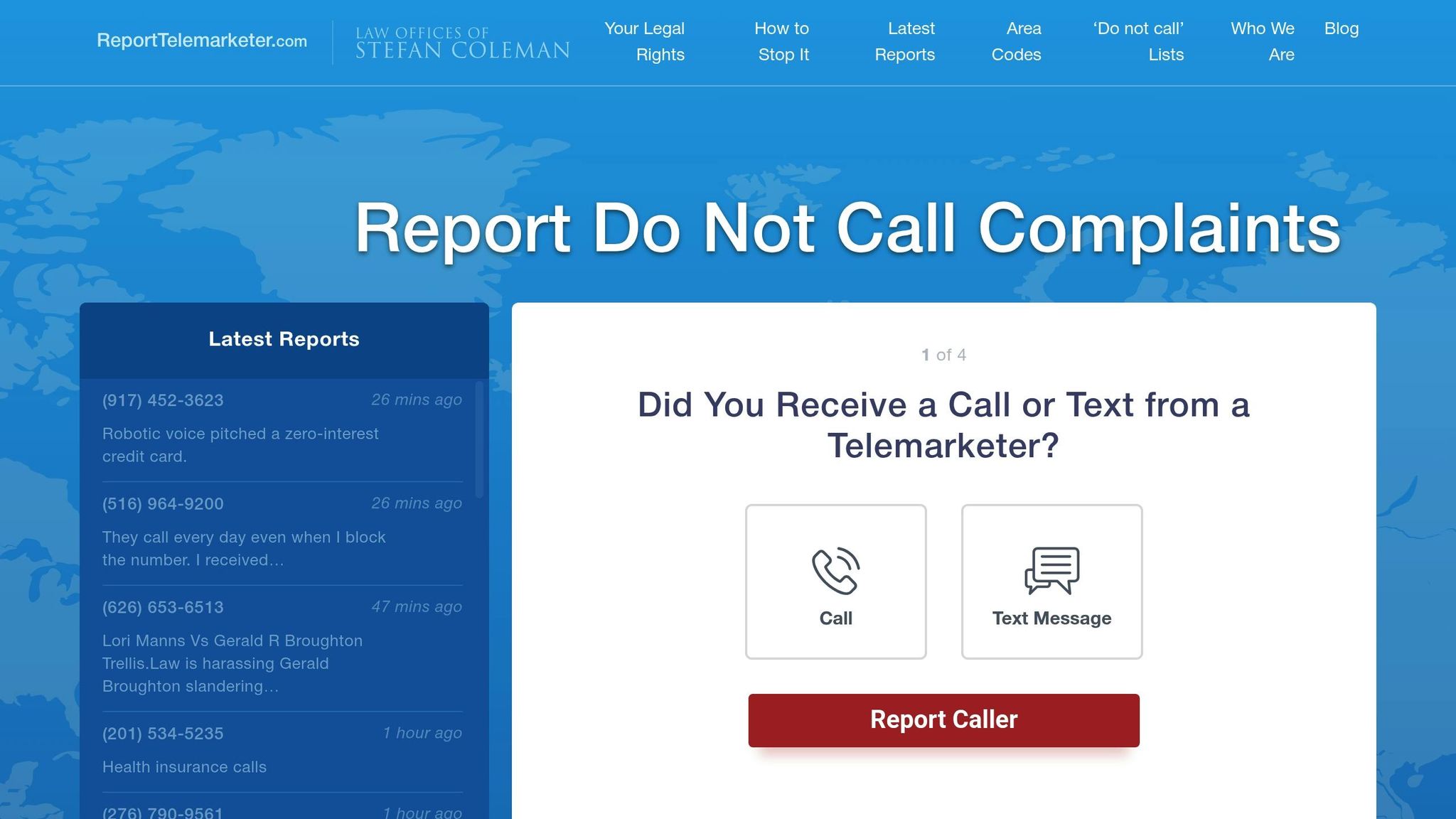
Tired of telemarketers? Verification services can help. They track, document, and provide evidence of telemarketing violations, giving you the tools to protect your rights and even pursue legal action. Here’s how they work:
- Track call details: Log dates, times, and call frequency.
- Document interactions: Record conversations (when allowed by law).
- Verify consent: Confirm if you gave permission for contact.
- Prepare legal evidence: Organize reports for court use.
With features like secure data storage, consent tracking, and reporting tools, services like ReportTelemarketer.com help consumers stop unwanted calls and claim up to $500 per violation. Whether it’s identifying repeat offenders or filing complaints, these tools are designed to protect you from telemarketing harassment.
What Verification Services Do
Basic Functions and Purpose
Verification services play a key role in keeping telemarketing activities in check. They systematically monitor and document calls, creating strong legal records that can stand up in court. These services help track unwanted calls, identify those responsible, and compile evidence of harassment.
"Our team of expert researchers will use an assortment of tools to try to identify the telemarketer calling or texting you." – ReportTelemarketer.com
Here’s what these services typically focus on:
- Identification: Using advanced tools to trace and pinpoint telemarketers behind unauthorized calls.
- Documentation: Recording call details like patterns, frequency, and content to build a comprehensive case.
- Investigation: Evaluating whether the calls violate consumer protection laws.
Next, let’s dive into the key features that make these services effective.
Must-Have Service Features
To ensure reliable evidence collection, verification services need specific features that support their identification, documentation, and investigation efforts. Below are some critical features and their purposes:
| Feature | Purpose | Impact |
|---|---|---|
| Call Tracking System | Logs call details | Provides a timeline of evidence for legal action |
| Caller ID Database | Keeps records of known telemarketers | Identifies repeat offenders |
| Consent Verification | Tracks consent status | Proves violations of consent requirements |
| Secure Data Storage | Protects evidence with encryption | Maintains evidence integrity for legal proceedings |
| Reporting Tools | Creates detailed violation reports | Supports formal complaints and cease-and-desist actions |
Services like ReportTelemarketer.com highlight the importance of these features, having helped over 30,000 individuals document and address unwanted telemarketing calls.
For these services to succeed, they must meet strict standards of accuracy and comply with legal guidelines. This includes securely storing all records, documenting interactions thoroughly, and ensuring evidence can be used in court. The most effective services combine automated tracking systems with expert human oversight to investigate violations thoroughly.
Call Recording Methods
Recording Storage and Security
Verification services rely on secure systems to handle and safeguard call recordings. These systems use encrypted storage, strict access controls, and detailed audit logs to ensure proper protection. For example, platforms like ReportTelemarketer.com record calls for documentation and investigative purposes. These recordings are securely stored and only shared with law firms when required for legal cases.
| Storage Requirement | Purpose | Security Measure |
|---|---|---|
| Encrypted Storage | Safeguard sensitive call data | Uses industry-standard encryption protocols |
| Access Logging | Monitor recording usage | Maintains detailed audit logs for all access |
| Backup Systems | Protect against data loss | Redundant storage at secure locations |
| Retention Policies | Meet regulatory requirements | Time-based limits based on legal guidelines |
These measures comply with legal standards, which are further discussed in the section on call recording laws.
Call Recording Laws
Recording telemarketing calls must comply with both federal and state laws, which often vary depending on the jurisdiction. Some important legal points include:
- Consent and notification: Certain states require consent from all parties involved, while others only need one party’s consent. Regardless, all parties must be informed that the call is being recorded.
- Retention timelines: Recordings must adhere to specific time frames for how long they can be stored.
- Usage restrictions: Recordings should only be used for appropriate purposes, such as legal evidence.
When used as legal evidence, recordings must comply with laws like the Telephone Consumer Protection Act and the CAN-SPAM Act. Verification services typically outline their recording and consent practices in their privacy policies. For example, ReportTelemarketer.com explicitly states that their services are not intended for use in California to align with local regulations.
Consent Tracking Systems
Building Consent Records
Verification services use specialized systems to document and monitor consumer consent for telemarketing communications. These systems keep detailed records, including when and how consent was given, timestamps, the source of consent, and the specific permissions granted.
Here’s a breakdown of key consent record components:
| Consent Record Component | Purpose | Documentation Method |
|---|---|---|
| Opt-in Timestamp | Confirms when consent was provided | Digital timestamp |
| Contact Method | Tracks approved communication channels | Selection options (e.g., call, text, email) |
| Source Tracking | Identifies where consent originated | Form logs and IP records |
| Permission Scope | Defines the limits of permissible contact | Detailed acceptance records |
Services like ReportTelemarketer.com rely on proprietary tools to verify consent and ensure the records are legally sound. These records are then used to identify any inconsistencies in communication practices.
Finding Consent Violations
Automated systems play a crucial role in spotting potential consent violations. These systems compare contact attempts with stored consent records to identify any unauthorized communications. If a violation is flagged, it triggers an investigation.
Common signs of consent violations include:
- Timestamp issues: Calls or messages made before consent was granted or after it expired.
- Channel discrepancies: Using communication methods not approved by the consumer.
- Scope mismatches: Contacting consumers about topics or purposes outside the agreed permissions.
For instance, when consumers report unsolicited calls, ReportTelemarketer.com analyzes the telemarketer’s contact history against its consent records. If no valid consent is found, they may take legal steps such as sending a cease-and-desist letter or filing a formal complaint.
To stay compliant, regular updates to systems and privacy policies are essential. ReportTelemarketer.com’s privacy policy, updated on July 13, 2023, ensures that their consent tracking practices meet current legal standards. These automated checks not only uphold consumer rights but also strengthen legal cases by ensuring all communications are consensual.
sbb-itb-a8d93e1
Legal Evidence Standards
Types of Proof Available
Verification services collect various forms of evidence to build strong legal cases against telemarketers. These include:
| Evidence Type | Documentation Details | Legal Importance |
|---|---|---|
| Call Records | Timestamps, duration, and frequency | Shows a pattern of repeated contact |
| Consent Logs | Opt-in dates and recorded permission scopes | Confirms whether contact was allowed |
| Call Recordings | Detailed recordings of call content | Captures specific details of calls |
| Digital Footprints | IP addresses, email open rates, link tracking | Verifies attempts to contact |
Verification services ensure all evidence maintains strict chain-of-custody protocols. For instance, ReportTelemarketer.com keeps detailed digital records to confirm the reliability of submitted reports. These records are critical for courtroom use, where precise documentation is required.
Court Submission Guidelines
After gathering evidence, following proper submission procedures is crucial to ensure it can be used in court. Verification services don’t just collect evidence – they also help present it effectively for legal challenges:
1. Authentication Requirements
Evidence must include metadata to confirm its reliability. For example, ReportTelemarketer.com’s system automatically logs metadata like IP addresses, email open rates, and link tracking data.
2. Privacy Compliance
Evidence must adhere to strict privacy rules. ReportTelemarketer.com protects user information, keeping email addresses and phone numbers private. Only necessary details about violations are shared, and only with authorized legal representatives.
3. Documentation Organization
Organizing evidence systematically is essential. This includes arranging communications in chronological order, labeling consent records clearly, and ensuring timestamps are accurate.
Legal professionals review all evidence collected by services like ReportTelemarketer.com before submission. These services also work closely with law firms to evaluate claims and prepare evidence packages that meet court standards.
Keep in mind, the information offered by ReportTelemarketer.com is for informational purposes and should not be considered legal advice.
For the best results, evidence packages should clearly highlight violations of consumer protection laws. Tools like ReportTelemarketer.com are designed to document breaches of the Telephone Consumer Protection Act, helping support legal action against telemarketers.
Selecting a Verification Service
Key Selection Criteria
When picking a verification service, it’s important to focus on providers that can thoroughly document telemarketing violations. Here’s what to consider:
| Feature | Why It Matters | What to Look For |
|---|---|---|
| Privacy Protection | Protects user data | Secure data handling and clear privacy policies |
| Evidence Collection | Tracks violations effectively | Automated tracking of calls, texts, and consent |
| Data Security | Safeguards sensitive info | Encrypted storage and strict access controls |
| Documentation | Builds strong legal cases | Detailed metadata logging and accurate timestamps |
| Legal Compliance | Ensures law adherence | Compliance with consumer protection laws |
A good service should log all communications, including IP addresses and email tracking, to help build a solid legal case. These factors provide a framework for assessing how ReportTelemarketer.com’s free service meets consumer protection needs.
ReportTelemarketer.com: Free Consumer Protection

ReportTelemarketer.com offers a free service designed to identify and address unwanted calls using specialized tools. The platform investigates reported phone numbers and takes action by issuing cease-and-desist letters or filing formal complaints.
Their tracking system captures:
- Call patterns and frequency
- Records of digital communications
- Documentation of consent
- Evidence of violations
- Compliance data for legal standards
These automated tools not only simplify reporting but also ensure the evidence meets court standards. With over 30,000 individuals assisted, ReportTelemarketer.com shows how effective documentation and legal action can help stop unwanted calls for good.
Related video from YouTube
Conclusion
Verification services help shield consumers from intrusive telemarketing calls by providing reliable evidence that can hold up in court. These services blend advanced tracking technology with legal know-how to build strong cases against those violating consumer protection laws.
Key aspects of their approach include:
- Thorough call pattern documentation
- Securely storing communication records
- Tracking consent violations systematically
- Gathering evidence suitable for legal proceedings
"As a consumer protection firm, we use the telephone consumer protection laws to stop telemarketers from harassing consumers." – ReportTelemarketer.com
By maintaining detailed records and using specialized investigative tools, these services not only discourage illegal practices but also turn individual complaints into actionable legal cases.
The strength of these services lies in merging technology with legal expertise, creating a reliable system that defends consumer rights and ensures telemarketers follow the rules.